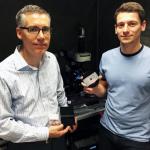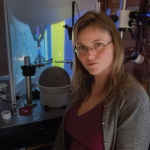The American Neurological Association (ANA), the professional organization representing the nation’s top academic neurologists and neuroscientists, has announced the winners of its…
News
The inner-workings of the neural circuitry that underlies brain function is better understood today thanks to recent technological advances developing new tools that increasingly peel back the…
Neuroscientists at the Georgia Institute of Technology and the Massachusetts Institute of Technology (MIT) have demonstrated that by exposing mice to a unique combination of light and sound, they…
Mice have a bad and undeserved reputation as an animal that can’t see very well, a characterization upheld most notably (and somewhat tragically) by the song Three Blind Mice. And also by…
Mice have a bad and undeserved reputation as an animal that can’t see very well, a characterization upheld most notably (and somewhat tragically) by the song Three Blind Mice. And also by…
Two faculty members from the Wallace H. Coulter Department of Biomedical Engineering at the Georgia Institute of Technology and Emory University have been awarded research fellowships from the…
Chethan Pandarinath, assistant professor in the Wallace H. Coulter Department of Biomedical Engineering at Georgia Tech and Emory, has been awarded an Interdisciplinary…
Chethan Pandarinath, assistant professor in the Wallace H. Coulter Department of Biomedical Engineering at Georgia Tech and Emory, has been awarded an Interdisciplinary…
For decades, a laboratory technique called patch clamping has been the gold standard for measuring the electrical properties of individual cells.
The process, which has been particularly…
For decades, a laboratory technique called patch clamping has been the gold standard for measuring the electrical properties of individual cells.
The process, which has been…
You want to find a friend in a crowded sports stadium because he has your cell phone. He’s wearing a yellow ballcap and sitting in the upper deck, so your eyes scan the scene like a camera,…
You want to find a friend in a crowded sports stadium because he has your cell phone. He’s wearing a yellow ballcap and sitting in the upper deck, so your eyes scan the scene like a camera,…
Eva Dyer, a researcher in the Petit Institute for Bioengineering and Bioscience at the Georgia Institute of Technology, is the recipient of a $175,000 award from the National Science Foundation (…
Annabelle Singer plans to develop, for the first time, a non-invasive way to drive neural activity with millisecond precision deep within the brain, while at the same time drafting the brain’s…
Like a diligent team of detectives, the researchers in Cassie Mitchell’s lab are busily gathering evidence to implicate what they believe is the chief suspect in Alzheimer’s disease, and now they…










